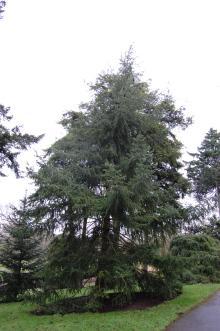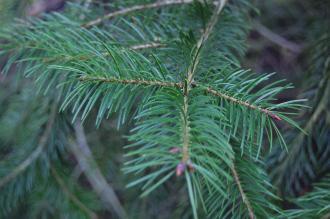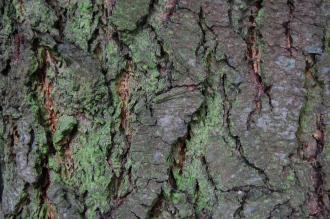
Pseudotsuga macrocarpa (09/02/2013, Kew Gardens, London)
Position: Full sun to light shade
Flowering period: Early spring
Soil: Moist, well drained
Eventual Height: 30m
Eventual Spread: 30m
Hardiness: 8a – 10a
Family: Pinaceae
Pseudotsuga macrocarpa is a long lived evergreen coniferous tree with a conical habit. Its blue/ green leaves are needle like, up to 5cm long and 1.5mm broad. Its trunk may achieve a diameter of up to 1m. Its grey/ brown bark is deeply ridged and when mature may be up to 20cm thick. Its monoecious flowers are in the form of pollen and fruit cones, the male pollen cones are yellow. Its pendulous fruit are cones, up to 20cm long and 7cm broad and mature in late summer.
Pseudotsuga macrocarpa, commonly known as the Bigcone Douglas Fir or Bigcone Spruce, is native to south California, USA. In its native habitat it grows on slopes, cliffs and canyons in mixed conifer forests. This tree is classified as Near Threatened by the IUCN Red List of Threatened Species.

Pseudotsuga macrocarpa Leaf (09/02/2013, Kew Gardens, London)
The etymological root of the binomial name Pseudotsuga is derived from the Greek pseudo meaning ‘false’ and Tsuga another conifer tree. Macrocarpa is derived from the Greek makros meaning ‘long’ or ‘large’ and karpos meaning ‘fruit’.
When available, the landscape architect may find Pseudotsuga macrocarpa useful as a drought tolerant evergreen conifer tree.
Ecologically, Pseudotsuga macrocarpa the seeds of this tree are attractive to some birds and mammals.

Pseudotsuga macrocarpa Bark (09/02/2013, Kew Gardens, London)
Pseudotsuga macrocarpa prefers moist, fertile, well-drained soils. It tolerates most pH of soil.
Pseudotsuga macrocarpa requires little maintenance.

